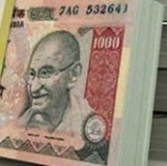SC refuses to extend use of demonetised currency
16 Dec 2016
The Supreme Court has refused to extend the use of demonetised Rs500 and Rs1,000 notes in government utility centres like hospitals and railway tickets, etc, but asked the government to fulfill the commitment of allowing individuals to withdraw a minimum of Rs24,000 per week as notified by it.
 The apex court also stayed proceedings on petitions against demonetisation notification in all high courts across the country saying that only the apex court would hear them.
The apex court also stayed proceedings on petitions against demonetisation notification in all high courts across the country saying that only the apex court would hear them.
In its interim order on demonetisation, a three-judge bench headed by Chief Justice T S Thakur of the Supreme Cvourt refused to interfere with the centre's decision firmly underlining that ''these are matters of fiscal policies.''
The Supreme Court, which is hearing a batch of petitions challenging the 8 November government notification on demonetisation, referred questions related to the policy to a five-judge Constitution bench.
The court also accepted the assurance by the AG that the Rs8,000 crore in old demonetised currency collected by district cooperative banks between 11 and 14 November would be allowed to be exchanged for new currency.
''They (government) must adhere to Rs24,000 notification unless it is modified,'' a three-judge bench headed by Chief Justice T S Thakur observed after senior advocate Kapil Sibal, appearing for a petitioner who has challenged demonetisation move, said that people don't have cash due to which they are facing hardships.
Sibal said that under the RBI notification, one is allowed to withdraw Rs24,000 per week and no one could be denied this right.
''The Attorney General is saying that they have a problem of currency and they don't have enough cash. They should not have given this right if they don't have the cash,'' he told the bench, also comprising Justices A M Khanwilkar and D Y Chandrachud.
Sibal also said district cooperative central banks (DCCBs), which collected Rs 8,000 crore in three days after the November 8 demonetisation notification came into effect, have been denied permission to exchange and deposit old currency notes due to which the business of these banks was suffering.
Countering the submissions, attorney general Mukul Rohatgi said that old currency notes worth Rs8,000 crore collected by DCCBs across the country have been allowed to be deposited in the Reserve Bank of India (RBI).
''DCCBs have collected Rs8,000 crore in three days. We have allowed them to deposit this amount to the RBI subject to KYC norms and we will issue a notification in this regard within two days,'' Rohatgi said.
To this, the bench asked, ''They (DCCBs) want their business to continue. The other part is that why they have been discriminated upon as compared to other banks,''
The attorney general said DCCBs are not governed by the RBI rules and the problem in allowing them to deposit old notes was that ''there may be unaccounted money and there was no way to find to out as to who has deposited it.''
''People are depositing money in large number. You have to give them the currency. You are staggering the payment. What is the time frame in which you will do it. This is what we want to know from you. We understand your problem of shortage of currency but you ought to have some norms,'' the bench told Rohatgi.
When the bench asked the Attorney General as to when the Rs8,000 crore, which DCCBs would deposit in RBI, would be returned to them, Rohatgi said he can't give a fixed time frame for this as ''it can't be a uniform policy and it has to be seen on a day-to-day basis''.
The bench, however, said, ''Then it is unpredictable. You must have a policy. The ratio should be same for all banks.''
However, the bench wanted to know as to why old currency notes would not be accepted in government-run hospitals despite the fact that enough cash was not there in the market.
''In government hospitals, you should allow old notes when you have not been able to dispense enough cash to the public,'' the bench said.
The Attorney General cited the example of allowing old currency notes at the petrol pumps and said it had to be stopped as the relaxation was ''misued'' and the petrol pumps were taking money in low denomination notes but they were depositing it in Rs1,000 and Rs500 notes only.
''Rs13 lakh crore have come so far. These are executive policy and courts can't say what should be the exemptions,'' Rohatgi said.
On the issue of why old currency notes were not accepted in government hospitals, he said that ''legal tenders are also available in the market and there are other ways to make payments''.
The Attorney General also said that new currency notes of value of Rs5,00,000 crore is in circulation in the market and besides this, Rs2,50,000 crore in smaller denominations of Rs100 and Rs50 was already there.
The bench, however, asked how large amount of money in new currency notes was being seized in raids by the authorities.
''How are some people getting crores in new currency? How is somebody able to get so much money?'' the court said. To this, Rohatgi said some bank officials have been arrested for alleged swindling of money and continuous raids were being conducted for recovering unaccounted money.
The Supreme Court is expected to also take up issues referred to the various high courts as the petitions move to the apex court for hearing.
The bench, however, said it would consider all the aspects and would pass an appropriate order.



















